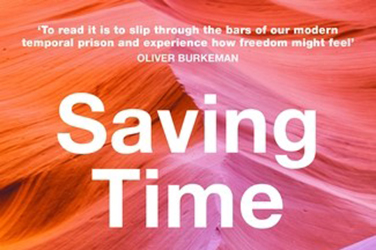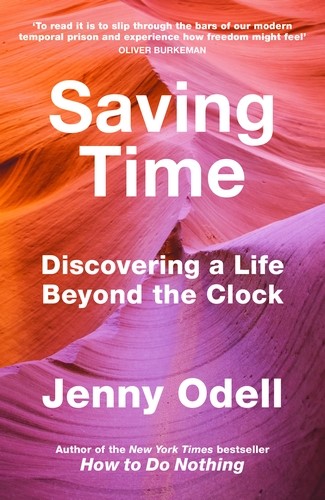
- Free Article: No
- Contents Category: Society
- Review Article: Yes
- Article Title: In search of lost time
- Article Subtitle: A rushed sequel to a bestseller
- Online Only: No
- Custom Highlight Text:
Saving Time is inspired by the burnout many of us feel after years of lockdowns and working from home. She writes about her own experience of these years, the anxiety and loneliness, contemplating moss. This frame dominates Saving Time’s billing. As a parent of two boys living and working in a city distant from family, it’s what drew me to the book. This theme of embracing slowness is addressed in each chapter, each of which is interwoven with minutely observed vignettes from an unhurried journey through Oakland’s hinterland.
- Featured Image (400px * 250px):

- Alt Tag (Featured Image): Tim McMinn reviews 'Saving Time: Discovering a life beyond the clock' by Jenny Odell
- Book 1 Title: Saving Time
- Book 1 Subtitle: Discovering a life beyond the clock
- Book 1 Biblio: Bodley Head, $35 pb, 252 pp
- Book 1 Cover Small (400 x 600):

- Book 1 Cover (800 x 1200):

In addressing this crisis of masculinity, he is shouting into the same echo chamber as Jordan Peterson, Andrew Tate and many others. As I read Saving Time: Discovering a life beyond the clock by Jenny Odell, I kept thinking of the Liver King. Superficially, it’s hard to conceive of their having anything in common, and I suspect Odell would cringe at the association. She is scornful of ‘productivity bro’ culture. But what Johnson and Odell both do is tap the irresistible human urge to ground self-help and visions of the good life in imaginings of our deep past. In the case of the Liver King, this is a vision of man the hunter, clad in skins (well, partially – gotta flex those pecs!) with his Liver Queen and children. Odell’s vision is of a past where average people and communities had more autonomy over their time; autonomy lost to rampant commercialisation and exploitation.
Saving Time is inspired by the burnout many of us feel after years of lockdowns and working from home. She writes about her own experience of these years, the anxiety and loneliness, contemplating moss. This frame dominates Saving Time’s billing. As a parent of two boys living and working in a city distant from family, it’s what drew me to the book. This theme of embracing slowness is addressed in each chapter, each of which is interwoven with minutely observed vignettes from an unhurried journey through Oakland’s hinterland.
But the book unfolds quite differently. Early on, Odell locates the root of our troubles as temporal autonomy lost to an equation of ‘time as money’, a play on the well-worn aphorism. From this follows a patchy and disjointed history of sorts, infused with hindsight, brimming with anger and blame towards a faceless ‘them’ who landed us in our predicament. Odell meanders across the ground of heterodox economics, gender theory, and intersectionality. The sway of the powerful over the time of everyone else – particularly the vulnerable – is Odell’s main preoccupation. There is something to this, but the framing of ‘time as money’ is too narrow and hobbles the work as a meditation on our experience of time in modern society.
The demands of capitalism, work, the market – choose your term – on our time are just a part of what is happening. In Debt: The first 5,000 years (2011), David Graeber writes of the web of social obligations which are deeply linked to modern systems of credit and money. The complexity of our society puts obligations on us as citizens, including on our time. Odell describes how, ‘at the start of the Covid-19 pandemic … the structure of my life was held constant’. Yet this stillness was either self-imposed or imposed by governments to protect the lives and health of fellow citizens. Who in New South Wales or Victoria cannot vividly recall how the structure of their days revolved around Gladys Berejiklian’s 11am briefings, or waiting for Dan Andrews with trepidation – jacket or vest? Odell gives this network of obligations the vaguest of nods, noting that, like language, ‘the observance of time systems … is what allows us to participate in an “intersubjective world”’. There is so much left unsaid about the non-economic demands on our time – of religious observance, parenting, care for the elderly, or participation in cultural practices – because it doesn’t fit with the ‘time as money’ frame.
Saving Time has a lot in common with How to Be Idle (2004) by Tom Hodgkinson. They share many references (such as Barbara Ehrenreich’s Nickel and Dimed [2001] and E.P. Thompson’s The Making of the English Working Class [1963]) and both hanker after a time when the pace of life was slower and working people had more autonomy over their time. One difference is that Saving Time is much less funny than How to Be Idle. And where Odell is vague about exactly when the past was better, Hodgkinson (following E.P. Thompson) knows precisely who he thinks used to live better lives: weavers in pre-industrial England. It’s a pity Saving Time is so earnest, while also being so hazy on the details. If your principal concern is reclaiming time from work, a solid dose of irreverence can only be an asset.
But Odell has some serious things to say that a chatty book written by a white man in the early 2000s just didn’t. For example, she points out it’s hard to be a flâneur when ‘walking while black’ in America. She also applies critical lenses that draw out some aspects of the experience of time by women and those with disabilities. These arguments are well made and ensure that Odell has made a contribution, if not fulfilling the promise of her idea.


Comments powered by CComment